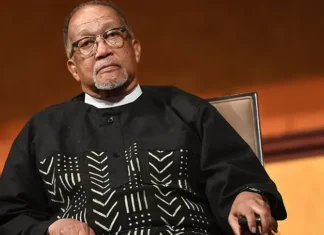
For the first time in history, the leadership team of the Maryland Legislative Black Caucus is made up entirely of women — and they’re making waves. Led by Del. Jheanelle Wilkins, this powerhouse group of lawmakers isn’t just pushing groundbreaking legislation on reparations, education, and criminal justice reform — they’re also grounded in a deep and unapologetic faith that forms the bedrock of their service.
In an era marked by political division, Delegates Wilkins, Stephanie Smith, Karen Toles, and Melissa Wells are blending policy and purpose — and showing what it means to lead with both power and prayer.
Indeed, Wilkins says there aren’t many institutions that continue to be boldly God-centered,
“As a caucus, we truly do have God and our faith at the center of the work we do,” she explains. She says as part of its leadership structure, the Legislative Black Caucus includes a chaplain and counts several pastors among its members, “some who even pastor their own churches.”
Every Black Caucus event and meeting begins with prayer. “It’s something so special to come together with your colleagues,” Wilkins says. Before difficult conversations or challenging meetings, “starting off in that prayer, that unity, that bowing our heads in the reverence for our Lord and Savior, and asking for that wisdom and for the spirit and those roots of the spirit,” makes a difference.
Wilkins says that’s “something that’s special and important about our caucus and probably is unique within the general Assembly and many organizations where we do have a faith-centered approach to our work.” She says it “shines through with the success and the types of bills and outcomes that we are able to have for Black Marylanders in the state.”
Wells says her mother was instrumental in her upbringing as a Christian, and it’s an important aspect of being an elected official.
“You think about the life that Christ led as well in terms of service and the fact that we are led to serve and put the needs of others above ourselves, and to put the priorities of our communities above ourselves,” she says.
Wells says they are “community servants as elected officials.” So she leans “away from ego” and leads “with a sense of kindness and love for my colleagues, even when we disagree,” and for all Marylanders.
Smith says she grew up with “a grandmother born in 1909” who didn’t have many opportunities because of Jim Crow. “But the one thing no one could take away from her was her faith,” she says
“She was a leader in her church, and she was a leader in her community,” Smith says. “She might have only gone to the seventh grade, but she had more influence over a lot of different people of all levels of achievement because she had power they did not have. There’s no space for fear when you allow your faith to take its rightful place in your life and in your heart.”
The delegates also spoke candidly about some of the legislation they’re working on. Their responses are edited for length and clarity.
Word in Black: Tell me a bit about your favorite piece of legislation this session, beginning with Delegate Wells.
Melissa Wells: I really want to lift up the Maryland Second Look Act. We know that Maryland is among the states ranking highest in terms of incarceration of African-American males.
I’m really pleased with the way that, as a Caucus, one, we continue to lift up criminal justice and make sure that we’re focusing on ways that we can help right some of the wrongs in terms of the egregious over-sentencing that took place. So we’re not talking about no lack of accountability, we’re talking about making sure there’s justice and equity in how folks are sentenced.
WIB: How would the first manifestation of that be for someone who actually needed it?
MW: It allows for someone to appeal to a judge, and it allows for judges to take a look at the sentencing process and to consider whether or not they believe that person was harshly over-sentenced for that offense. It doesn’t let people out of jail. It just allows for them to look at the sentencing process that took place when they were initially sentenced. And there are limitations to what offenses would be qualified under that.
WIB: Delegate Jheanelle Wilkins, as chair of the leadership team, please share with us the legislation you’re most proud of.
Jheanelle Wilkins: I am proud to serve on a majority-woman executive team of the Legislative Black Caucus of Maryland. We are the largest Black caucus in the country with 67 Black House and Senate members of the legislature. And we put forward a robust agenda, a bold agenda, every single legislative session that deals with issues around housing. Particularly this year, we looked at bias in appraisals, which steals wealth from Black communities and Black homeowners.
We really saw a need to go even deeper and go even bolder this legislative session, and particularly look at the root causes. The racial wealth gap is directly related to issues around redlining in our state, and is directly related to the lack of access to capital by law and the practices of banks and other institutions.
I’m extremely proud of that bill that the caucus prioritized. That bill, unfortunately, was vetoed recently, and we as a caucus are working with our colleagues to ensure that we finish that work and that the bill around the commission on reparations does become law in the state.
WIB: So what did we misunderstand? Because it sounded like another study. So the thought was that we need actual reparations, rather than another study.
JW: It’s truly mis- and disinformation around the bill being another study. It’s truly a commission because we want to make sure that we not just have a conversation again around slavery, but talk about the harm in our state that has taken place whether it was Jim Crow, and have direct, whether it’s monetary, whether it’s tax credits, whether it’s specific policy shifts that benefit Black people, to really have a comprehensive look.
WIB: Well, we stand corrected. Thank you very much. Delegate Smith, would you please share.
SS: Maryland was egregious in underfunding their four public institutions. We, as a Black Caucus, were able to champion through our speaker a bit of repair of that underfunding. However, there are still challenges for our institutions, particularly on the Capitol front. And so I want to lift up the University of Maryland Eastern Shore, which is not only an HBCU, it’s the only 1890 land grant HBCU in the state of Maryland.
We’ve been trying to memorialize through the budget, a standing extra provision of $5 million to underscore the underfunding of 1890 land grant HBCUs by the federal government. We are pleased that our governor has at least kept that commitment despite the law not passing. But we also realize that they have some extreme challenges around the quality of their dorms.
Because so many of their students come from Prince George’s, Baltimore City, and areas outside of the Eastern Shore, they are really relying on housing options provided by the campus. We were able to get seed funding to help them build 400 new beds.
These are the unsung moments that mean a lot to me. That first-generation student is going to a place and probably an area of the state they haven’t been to before, and they should be able to lay their head down in a clean, safe space where they can continue to prosper, learn, and then hopefully take all they’ve learned back communities from which they hail.
WIB: What about your bill, Delegate Toles?
Karen Toles: A bill I did was regarding suspending a driver’s license for your child support not being paid. The bill states that if you make below the federal poverty level, which is about 250% below the poverty level, which is about $38,000, then they should not suspend your driver’s license. That’s important because if your driver’s license is suspended, you cannot work. If your driver’s license is suspended, you cannot spend time with your children, which is critical. And so I was just pleased to see that bill finally get over the finish line.















